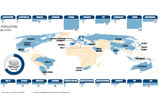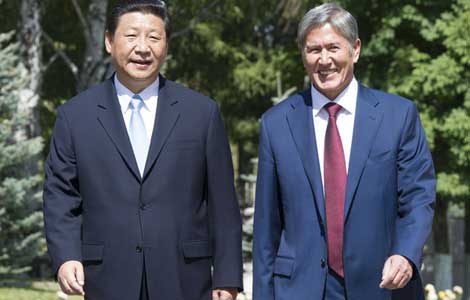
Full text: President Xi's joint written interview with media from Turkmenistan, Russia, Kazakhstan, Uzbekistan, Kyrgyzstan
Updated: 2013-09-03 21:54
(Xinhua)
|
|||||||||
5. What has made it possible for the G20 Leaders' Summit to play an important role in tackling the international financial crisis? How is the G20 different from other mechanisms for international economic cooperation? What is China's view on G20's role in the present-day world?
The G20 consists of both developed countries and emerging economies. It operates on consensus and reflects the changing world economic landscape as well as shifts in international economic relations.
After the outbreak of the international financial crisis in 2008, the G20 was defined as the premier forum for international economic cooperation. As such, it has encouraged greater international coordination on macro-economic policies. It has taken a number of major steps, and gradually lifted the world economy out of the shadow of the financial crisis. In addition, it has promoted quota reform at the IMF and voting rights reform at the World Bank, established the more representative Financial Stability Board, and supported the WTO in playing a central role in the multilateral trading regime. By doing so, it has made important contribution to the improvement of global economic governance.
Right now, the G20 is in a transition from a crisis-management mechanism to one that is dedicated to long-term economic governance. If its members continue to follow the spirit of solidarity and win-win partnership, and take firm steps to strengthen macro-economic policy coordination, improve global economic governance, reform the international financial system, and promote global trade liberalization, the G20 will definitely embrace a bright future.
Related Stories
Xi meets Turkmenistan's president on ties 2013-09-03 19:39
Xi's planned visit to Turkmenistan lauded 2013-09-03 01:13
China-Turkmenistan ties becoming strategic 2013-09-02 06:54
China, Turkmenistan vow to strengthen co-op 2013-07-19 15:27
Schedule









